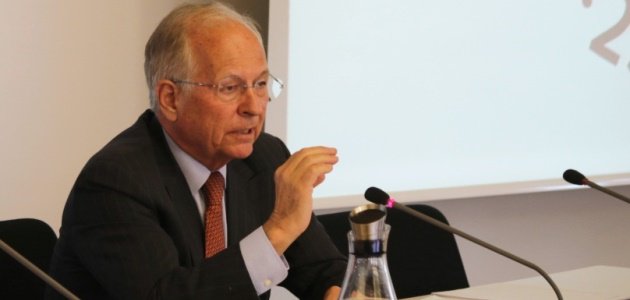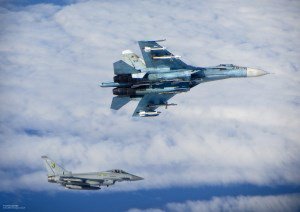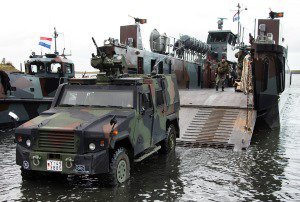The 2017 Core Course on Security Policy started with a discussion with Wolfgang Ischinger, the Chairman of the Munich Security Conference, about current transatlantic relations, the European Union and cyber security.

“The current situation is more dangerous for Europe than it was at any point in the 26 years since the collapse of the Soviet Union.” Wolfgang Ischinger provided a tour d’horizon of the crisis-ridden world of the year 2017. Picture: Federal Academy for Security Policy
At the beginning of the 2017 Core Course, Thomas Wrießnig, Vice President of the Federal Academy, welcomed Wolfgang Ischinger to the Academy as a distinguished speaker. As a former Ambassador of the Federal Republic of Germany, current chairman of the Munich Security Conference, and highly experienced crisis diplomat, Wolfgang Ischinger is held in high regard within the strategic community and beyond, both at the national and international level.
Navigator in transatlantic waters
“What is the matter with this world?” – Mr Ischinger’s introductory question did not remain a rhetorical one for the participants of the course. Crises and wars in the Middle East, a new threat in Eastern Europe, uncertainty about the positions of the Trump administration, terrorist attacks in Europe, as well as the imminent Brexit provided sufficient subjects for debate regarding Germany’s role in a world that seems to be in disarray. Due to his considerable experience in security policy, the views of the former ambassador to Washington were in particular demand with respect to the current transatlantic situation. Mr Ischinger said that mutual trust was the foundation for success in diplomatic relations. The level of trust between the United States and Russia, however, was currently close to zero. The hope expressed by some observers that the US and Russia would revive their traditional bilateral summit diplomacy under the new US administration had been shattered. Mr Ischinger’s security-political tour d’horizon then continued to the topic of Eastern Europe.
NATO in Eastern Europe: dialogue and reassurance

Military forces operating in close proximity of each other involves a danger of misinterpretations. An example of this is when a NATO fighter aircraft (bottom) encounters a Russian fighter aircraft (top) in international air space. Picture: Defence Images/Crown Copyright 2014/flickr/CC BY-NC-ND 2.0
Mr Ischinger in particular pointed to the renewed relevance of nuclear deterrence: “The current situation is more dangerous for Europe than it was at any point in the 26 years since the collapse of the Soviet Union.” Since the annexation of Crimea, Russia was increasingly using nuclear weapons to threaten other countries again. The implications were the same as in the era of the Cold War: “30 minutes advance warning – this is the reality in the year 2017.” The importance of dialogue and confidence building was all the greater in view of the risk of technical or human failure – and this was not limited merely to the nuclear context. Accordingly, there was always a danger of misinterpretations whenever military forces operated in close vicinity to each other, as encounters between Russian and US combat aircraft and also between naval vessels in the Baltic region had shown. Ischinger, who had taken part in the negotiations on the NATO-Russia Founding Act himself, simultaneously emphasised the legitimacy of the ongoing stationing of smaller NATO units in the Baltic States and Poland as a reassurance for the Alliance’s member states in Eastern Europe. Especially in view of Russia’s force levels in the region, it was important not to be deceived by Russian propaganda pretending otherwise.
Plea to strengthen European security policy

One example of intensified European defence cooperation is the formation of combined Dutch-German military units. The picture shows a Dutch landing craft landing a protected Bundeswehr vehicle on a beach during a combined exercise. Picture: Bundeswehr/Christian Thiel
Based on his general assessment that we “live in a dangerous world with dysfunctional global governance structures”, and faced with numerous questions as to what Germany and Europe should do in view of the current global situation, Mr Ischinger made a clear appeal that the EU should act with more confidence. Displaying unity and standing together, especially on security issues, was more important than ever before. Mr Ischinger was quite confident in his outlook, and he observed that, despite the ongoing debate on the future of Europe, the majority of member states still agreed that the EU should be strengthened in the area of security policy. Mr Ischinger therefore advocated a “resolute policy to integrate European defence efforts”. He added: “International diplomacy cannot be successful without sound military foundations. Unfortunately, kind words are not enough.” Mr Ischinger continued to say that it was also crucial to involve a united Europe in the negotiations between the US and Russia at the diplomatic level. Sustainable policies could not be established without involving the Alliance partners.
Cyber security: “We need an interpreter service”
Mr Ischinger observed that there was a need to take further action with regard to threats coming from cyberspace. Germany had been lagging behind in this respect for many years, although the recent developments associated with fake news and social bots had accelerated the cyber security debate in Germany. The upcoming general election in Germany highlighted the need to take action, because “an attack conducted by a few could not merely affect infrastructure but also damage the institutions of the democratic state – this is the brave new world we find ourselves in now”, according to Mr Ischinger. He added that the debate was confined to expert and specialist circles, and that one of the main problems was the lack of mutual understanding between politicians and technology experts. “One could say that we need an interpreter service to improve communication between these two groups”, he said.
The 2017 Core Course on Security Policy
Mr Ischinger’s tour d’horizon thus also covered some of the main topics of this year’s Core Course on Security Policy. The central theme of the three-month Core Course taking place in 2017 is Sustainable Development – Security – Crisis Prevention. The regional focus in this year is on Africa. Field studies in Ethiopia and Mali allow the course participants to gain a direct insight into those developments on the African continent that are relevant to security policy. In addition, the Core Course also includes a study tour to Washington, DC and to New York City. The Core Course has been taking place since 2016. It is geared towards senior officials from German ministries at the federal and state level, from the private sector, the fields of science, politics and media, as well as from Germany’s partner nations.
Authors: Katharina Pachmayr and Fabian Rohde
